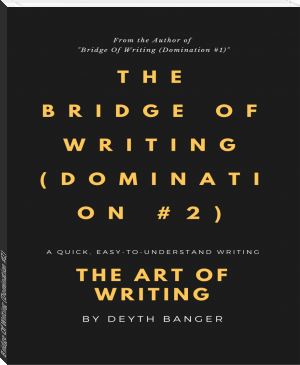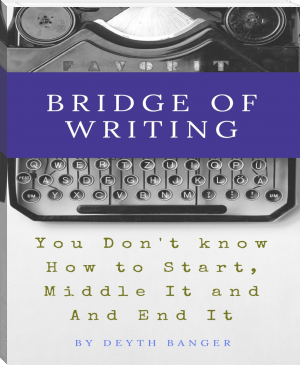Bridge Of Writing (Domination #2) - DeYtH Banger (e book reader android .txt) 📗

- Author: DeYtH Banger
Book online «Bridge Of Writing (Domination #2) - DeYtH Banger (e book reader android .txt) 📗». Author DeYtH Banger
2. Introduce the Detective and the Culprit Early On
As the main character, your detective must obviously appear early in the book. As for the culprit, your reader will feel cheated if the antagonist, or villain, enters too late in the book to be thought of as a viable suspect.
3 Introduce the Crime in the First 3 Chapters
The crime and the ensuing questions are the hooks that will engage the reader. As with any fiction, you want to introduce these as soon as possible.
4 The Crime Should be Violent, Preferably a Murder
For many readers, only murder really justifies the effort of reading a 300-page book while suitably testing your detective's powers. However, it's worth noting that other types of violence (such as rape, child molestation, and cruelty to animals) are taboo enough to warrant a mystery novel.
5 The Crime Should be Believable
While the details of the murder (i.e., how, where, why, and how the crime is discovered) are your main opportunities to introduce variety, make sure the crime is plausible. Your reader will feel cheated if the crime is not something that could actually take place.
6 The Detective Should Solve the Case Using Only Rational and Scientific Methods
Keep in mind this oath written by G.K. Chesterton for the British Detection Club, "Do you promise that your detectives shall well and truly detect the crimes presented to them using those wits which it may please you to bestow on them and not placing reliance on nor making use of Divine Revelation, Feminine Intuition, Mumbo Jumbo, Jiggery-Pokery, Coincidence, or Act of God?"
7 The Culprit Must be Capable of the Crime
It sounds like a no-brainer but keep in mind that your reader must believe your villain's motivation. And, the villain must be both physically and emotionally capable of the crime.
8 Don't try to Fool the Reader
Again, being implausible takes all the fun out of it. Don't use improbable disguises, twins, accidental solutions, or supernatural solutions. The detective should not commit the crime. All clues should be revealed to the reader as the detective finds them.
9 Do your Research
Mystery writer Margaret Murphy says, "Readers have to feel you know what you're talking about." Murphy has a good relationship with the police in her area and has spent time with the local police forensic team. Make sure you nail all the essential details.
10 Wait as Long as Possible to Reveal the Culprit
People are reading to find out, or figure out, the whodunit. If you provide readers with the answer too early in the book, the reader will have no reason to continue reading.
“Would you like to have lunch with James Patterson?”
I would.
So would many of you, I guess.
I’ve been a James Patterson fan for quite some time.
So when I had the opportunity to have lunch with the world’s bestselling author in Sydney, Australia in May this year, I immediately finalized my travel plans.
The lunch was organized by Dymocks Bookstore as part of their Literary Events at the luxury 5-star Shangri-La Hotel in the Sydney Rocks area, and was attended by 240 James Patterson fans.
Mr. Patterson was here to promote his latest venture into children’s books; a passion of his to get young people back into reading. As part of his visit he would also donate books worth $100,000 to local school libraries.
On the day, I flew in early from Brisbane, and checked into my hotel to relax and prepare for the event. I wanted to ensure I got the most from the lunch.
And I wanted to ask James Patterson a question.
At the venue, I was shown to my table, perfectly positioned in the front row right in front of the stage. I couldn’t have been happier.
Introductions were made—the 9 other guests at my table included the editor of a leading magazine, and an author of 6 novels.
Through the hour that lunch was served, James Patterson sat on stage being interviewed by a leading Australian radio personality.
Here’s what I gleaned from their conversation:
It’s never too late to start writing. Just start!
Work hard—there is no shortcut. He might have up to 50 projects on the go, 13-15 of them being in active mode. You need to put in the hours to complete this workload.
Read, read, read. Reading helps improve your life and your writing. Encourage young children to read.
Authors can ‘outdo’ actors. He told a funny story about having dinner with Clint Eastwood and a movie director in an Italian restaurant in Washington one night. A lady came up to their table and asked him for his autograph. Clint Eastwood commented that he “really needed a hit movie quick” after being overlooked by the woman.
The conversation was light-hearted, fun and entertaining. James Patterson came across as both down-to-earth and engaging.
Then it was Question time.
Of the 6 questions taken, I got the first one in.
“As a newbie author, how can I get my books seen so that I can sell more books? What marketing tips can you give me?”
Here’s what James Patterson told me:
Don’t worry about marketing. Leave that up to your publisher to figure out.
Learn how to plot and outline better. James Patterson told the audience that he writes outlines of around 80-90 pages and submits them to his co-author who then fleshes out his work. The co-author submits their progress work every week, which James Patterson edits and resubmits. This process continues until the whole book is complete.
Have a hook at the end of each chapter. It keeps the reader turning the page.
Write more. The more you write, the better you can potentially become. The more books you have out in the marketplace, the better the opportunity to make money.
Boom! Short and succinct.
Now while I did agree with the last two points, I was skeptical about ‘not worrying about marketing.’
As a newbie author trying to sell since February 2015, with no marketing muscle behind me, I was having very little sales success.
I also found myself being drawn into the marketing hype bombarding my email inbox on how ‘a particular software or a book promotion idea’ would solve all my sales dilemmas and catapult me to the top of the Amazon bestseller lists.
But I was willing to put his ideas into action.
After lunch, I thanked him for his advice, grabbed a signed copy of Truth or Die, and left.
When I headed home the next day, I was ready to act on his words of wisdom.
To help improve my plotting and outlining skills, I bought James Patterson’s Masterclass on Writing.
The course consists of 22 videos, pdfs and an outline of his book Honeymoon. The videos are entertaining, but the real juice is in the PDFs, work assignments, and the outline. You can even submit your work for critiquing; if you are game.
At $90 it’s a very worthwhile investment in your writing career. Grab it.
But the best advice I got from James Patterson was simply to work hard and write more.
After 5 months as a mystery, thriller and suspense author, my output has dramatically increased, with 4 novellas hitting the Top 10 in their respective categories, 2 of which hit #1 in both the US and UK.
Thanks, James Patterson, for your great insight. I’m now chasing you!
What part of his advice resonates most strongly with you? Share in the comments and on social media, please.
Five things I learned about writing from Dean KoontzI actually read most of my generation's YA books back when I was MG, so by the time I hit middle school I was on to adult books. I read a handful of different mystery and suspense authors, but nobody quite held my attention like Dean Koontz. Here's what I learned from devouring the entire Koontz catalog:
1. Write what you love. Dean Koontz loves dogs, especially golden retrievers. Not all of his books contain canine companions, but many do, and his human-animal relationships live and breathe on the pages. They talk directly to your heart, not because he's manipulating you with cheap sentimental tactics, but because the dynamics feel real. It's a lot harder to craft emotional scenes and sincere character interactions when you as a writer aren't passionate about your own words.
2. Begin with a bang. The Vision begins with the line "Gloves of blood." Do you want to know more? I did. In chapter one of Velocity, the main character finds a note on his car that reads: If you don't take this note to the police and get them involved, I will kill a lovely blond schoolteacher somewhere in Napa County. If you do take this note to the police, I will instead kill an elderly woman active in charity work. You have six hours to decide. The choice is yours. Holy high-concept! What kind of crazy person would leave this note? And what will the main character do? I ripped through Velocity in record time to get the answers.
3. Writing is hard work. According to his website, Dean Koontz reads over 150 books a year. He writes ten to eleven hours a day and sometimes revises a page forty or fifty times before moving on. He's written over sixty books, and when he was starting out he wrote as many as eight books in a single year. His first four books were never published. I know of a very few writers who managed to sell their first book for a giant pile of cash, but that is not the norm, and if you're an aspiring writer planning on hitting the big time with your first novel, you're probably setting yourself up for disappointment.
4. The execution matters more than the idea. I remember being skeptical when I heard the storyline for Odd Thomas, what is now my all-time favorite Koontz novel. Hmm. A guy who sees dead people. Didn't I see that in a movie not too long ago? Has Dean run out of ideas? Now that I have seen how slow publishing is, I know it's entirely possible that Dean had the idea for Odd Thomas before anyone saw The Sixth Sense. But who cares? Both works may use the same setup, but that's where the similarities end. Odd Thomas is a suspense novel, a horror story, and an epic love story all woven into one.
5. Don't forget to give something back. Dean Koontz and his wife, Gerda, have a charitable foundation that supports critically ill children and dogs. He also apparently finds time to answer occasional letters from mothers of debut authors such as myself. Yes, my mom actually put pen to paper and invited one of my writer-idols, the uber-mega-bestseller Dean





Comments (0)